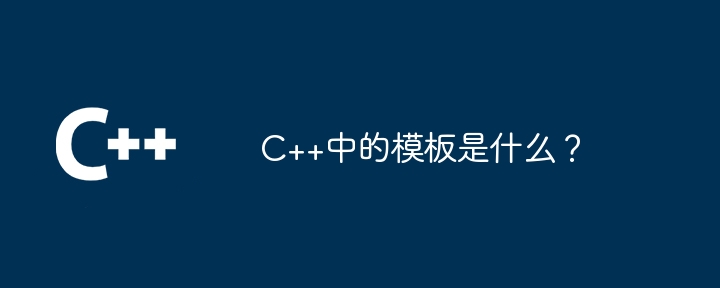Home >Backend Development >C++ >What are templates in C++?
What are templates in C++?
- 王林Original
- 2024-05-08 15:27:02595browse
Template is a C feature that allows the creation of reusable code without writing multiple versions. Using generic types as parameters allows you to create custom data types or algorithms at compile time. Key advantages include code reusability, type safety, performance optimization, and scalability. Be aware that templates can be difficult to read and maintain, they can take longer to compile, and generic types can cause code bloat.

Templates in C
Overview
Template is a powerful C feature that allows you to create reusable code without having to write multiple versions. It uses generic types as parameters, allowing you to create custom data types or algorithms at compile time.
Basic syntax
template<typename t></typename>
where T is the type parameter to be replaced.
Example: Creating a Generic Container
template<typename T>
class Stack {
private:
T* data;
int size;
};Now, you can create a stack using any type:
Stack<int> intStack; Stack<std::string> stringStack;
Practical Example: Comparison Function
Consider a function that compares elements in two arrays:
bool compareArrays(int a[], int n, int b[], int m) {
if (n != m) {
return false;
}
for (int i = 0; i < n; i++) {
if (a[i] != b[i]) {
return false;
}
}
return true;
}Using templates, you can generalize this function to compare arrays of any type:
template<typename T>
bool compareArrays(T a[], int n, T b[], int m) {
if (n != m) {
return false;
}
for (int i = 0; i < n; i++) {
if (a[i] != b[i]) {
return false;
}
}
return true;
}Advantages
- Code reusability
- Type safety
- Performance optimization (avoiding runtime type checking through compile-time evaluation)
- Extensibility (easy to extend to new types)
Notes
- Templates can make code difficult to read and maintain.
- Compilation time may be longer.
- Generic types may cause code bloat.
The above is the detailed content of What are templates in C++?. For more information, please follow other related articles on the PHP Chinese website!

